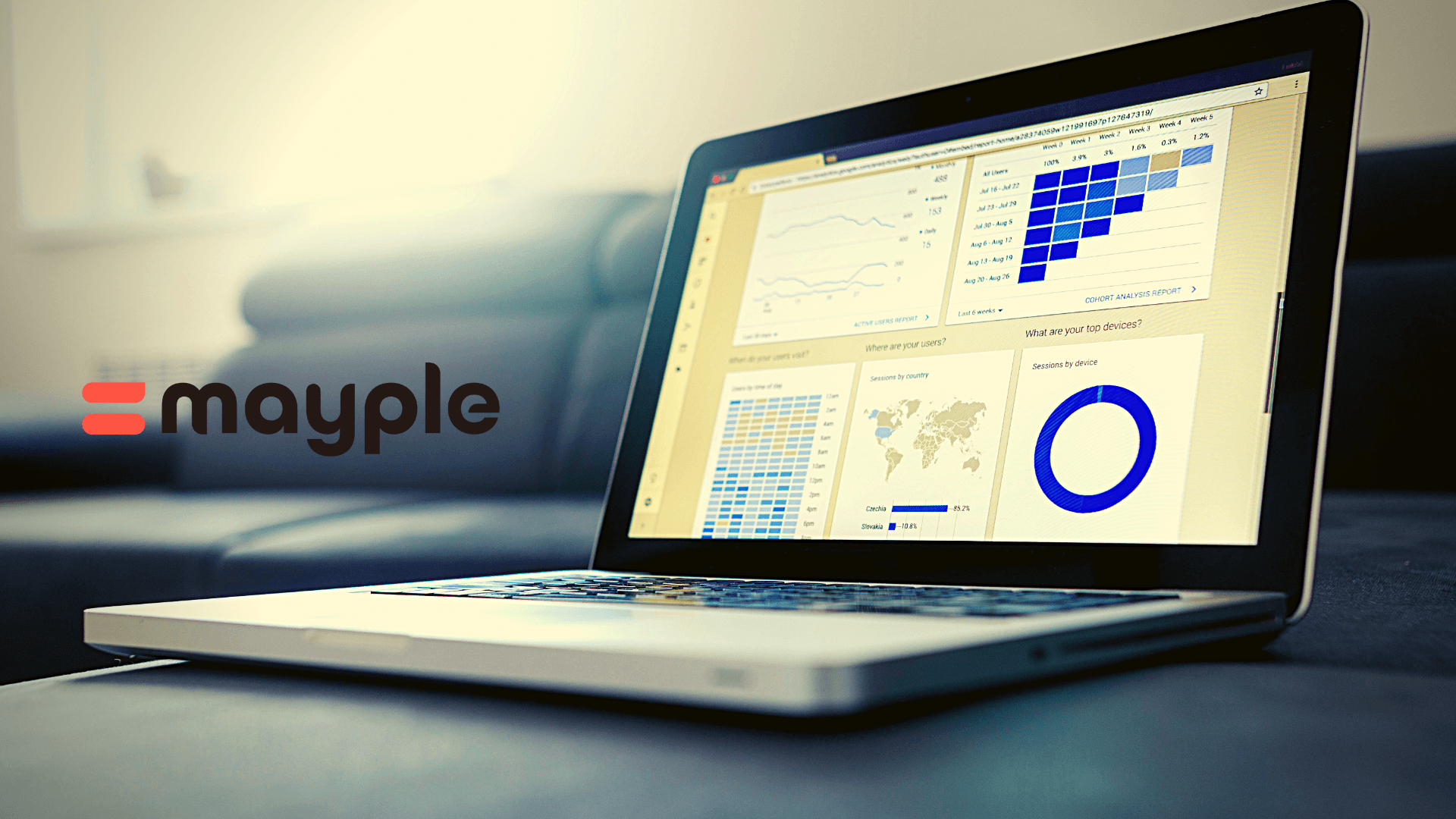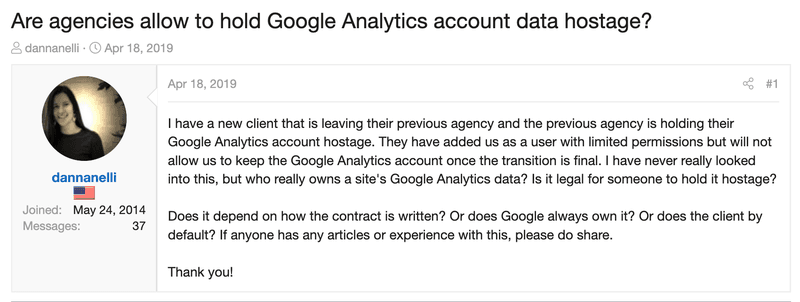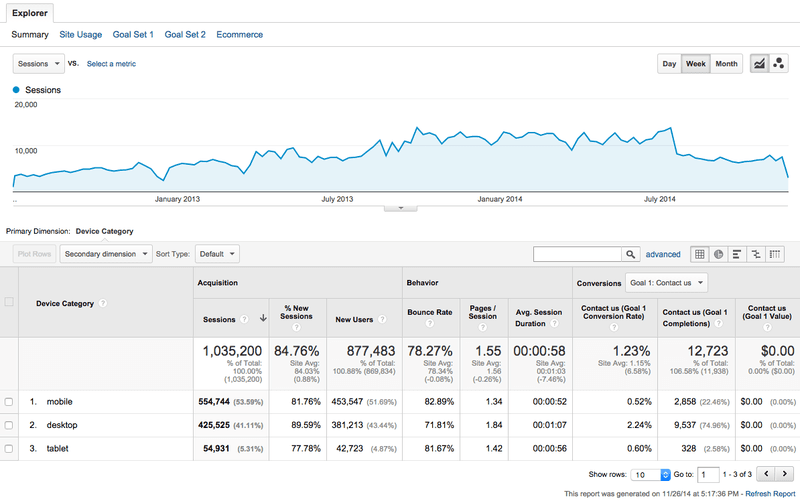How to Own Your Marketing Data When Switching Marketing Providers
You've left your marketing agency, this can lead to issues when they created the accounts for you and effectively own your marketing data as a result.
Updated November 7, 2024

Companies lead you to believe that you have ownership over your data. In reality, your Google Analytics data can be hijacked. Here's how to store your company's marketing data properly.
In the modern era of marketing, one of the most precious currencies available to marketers is their marketing data. When you begin working with an outside marketing agency, you may be led to believe that you still hold complete ownership over your company’s data, however, sometimes it turns out that this is not the case.
There are cases where companies ask their marketing agency to access their digital marketing platforms such as Google Analytics, Google Ads, LinkedIn, and even mailing list management services. This can lead to issues when your marketing agency creates the accounts for you and effectively own your marketing data as a result.
In some cases, more unscrupulous marketing agencies can restrict your access to these platforms, mishandle information and make a mess of your marketing campaigns. As the image below shows, this problem does occur in the marketing world, as Sterling Sky Search Forum user Dannanelli found out.
When taking on a new client, the user was surprised to learn that the customer’s previous agency was not going to hand over any historical data to the new agency by refusing to give Dannanelli access to the Google Analytics account when the handover was completed.
Users in the thread also pointed out accurately whether or not the agency will be able to do this is dependent on who owns the account in question. For example, if you own your own account and the agency has done something to lock you out, you can follow Google’s account recovery process.
It is uncommon for startups to make use of an outside marketing agency, with only 3% of surveyed businesses indicating that they use one. This can lead to confusion and a lack of knowledge surrounding the ownership of data and other key points in the working relationship.
This is why it is imperative that you take ownership of your marketing data.
The Importance Of Your Marketing Data
Your marketing data has the potential to be the absolute lifeblood of your company if it is utilized correctly. This is because your marketing data provides you with the opportunity to truly understand your customers, which in turn allows you to provide products and services that can be tailor-made for your customers. There is a wide variety of data that is available to marketers that can help them to profile customers. Some of the items which you may use include customer address, their spending habits, income, and any other item that may be relevant to you providing services to the customer.
For example, if you are a luxury car dealership, you are going to want to have a rough idea of your potential customer’s income, so you can target certain models to certain customers. Marketing data can be used to profile customers and therefore build new products for them, although other types of marketing data can also assist you in selling those new products. For example, by using social media data to analyze which platforms your customers use, you can choose to focus your online marketing efforts on those channels that are most profitable. It should also be noted that you should not only look at your own marketing data, but you should also take note of general marketing statistics, which can help to provide inspiration for your marketing campaigns.
How to Store Your Marketing Data
There are a large number of businesses that are still storing data in rigid formats, such as excel spreadsheets, and using manual processes for a lot of their operations. To maximize efficiency in your organization, it would be much more efficient to store all of your sales and marketing data in a database, or a data warehouse. Firstly, the main benefit that you would get from storing the data in this way is that it is completely centralized. This means that data from your CRM, your web analytics, and social media data can all be incorporated into the same space. This makes sure that you can look at a fully established view of your data, which is critical for the generation of accurate reports and analysis.
Storing your marketing data within a database also allows you to automate a lot of your processes. This is because storing all of your data in the same location allows you to consistently refresh your data, which ensures that it is always as up-to-date as possible.
This allows users to know that when they are reading a report, the information is appropriately up to date, removing the need for that user to go through manual procedures to update the data.
Additionally, making use of a database for your sales and marketing data can improve the accessibility of your data. This is because a majority of databases are compatible with third-party tools and different types of software.
This stretches even further with business intelligence and analysis platforms, with almost all of them being able to “plug in” to a variety of database types.
Finally, databases generally have a performance benefit when being analyzed compared to your data source. The reason for this is that databases are faster for querying and analysis, and they also contain all of the data that you require, as opposed to sections of it.
How To Keep Your Marketing Data
Of course, it may be the case that you do not have the time to handle your own marketing, at which point you may look to enlist the assistance of outside marketing vendors. If you do, one of the main items for thought is that you should never let the marketer collect your data by using a marketing platform account that is owned by their business, rather than yours. You can either provide the details to your marketing platforms or, ask them to copy the data into their own platform. This allows you to maintain control of your data, ensuring you are getting the full picture and you avoid any nasty surprises.
It is absolutely imperative that you ensure that you own your own advertising accounts because this is the only way for you to improve and optimize your marketing campaign results over the course of time. Digital marketing is different for every business and the last thing that you want is to have to repeat the process every time you replace your digital marketing agency.
Eventually, you will need to provide your digital marketing agency with access to your advertising accounts, however, you should always ensure that you’re doing it in a way that will protect the interests of your business.
Another point, that may seem obvious at an initial glance but is often looked over is limiting access to your marketing data within the company. You should only allow individuals who have a reason to view your marketing data to do so, this is because by doing so, you limit the security risk relating to your data by mitigating against a number of potential problems.
Firstly, you ensure that it is less likely for an accidental leak of your data to occur through vulnerabilities generated by high usage, and secondly, you also mitigate against the risk of someone deliberately stealing your marketing data for their own purposes. This is actionable as a large number of database systems can be restricted in sections with certain access privileges.






